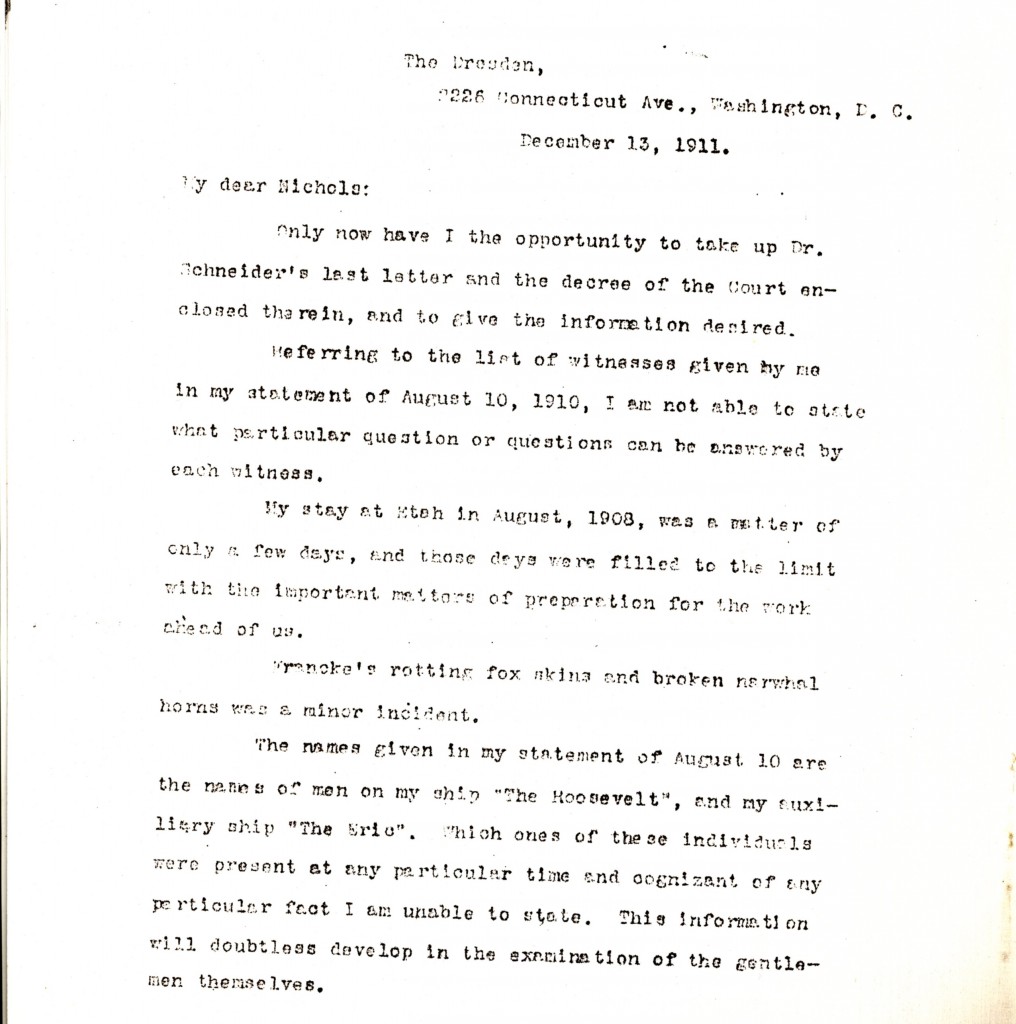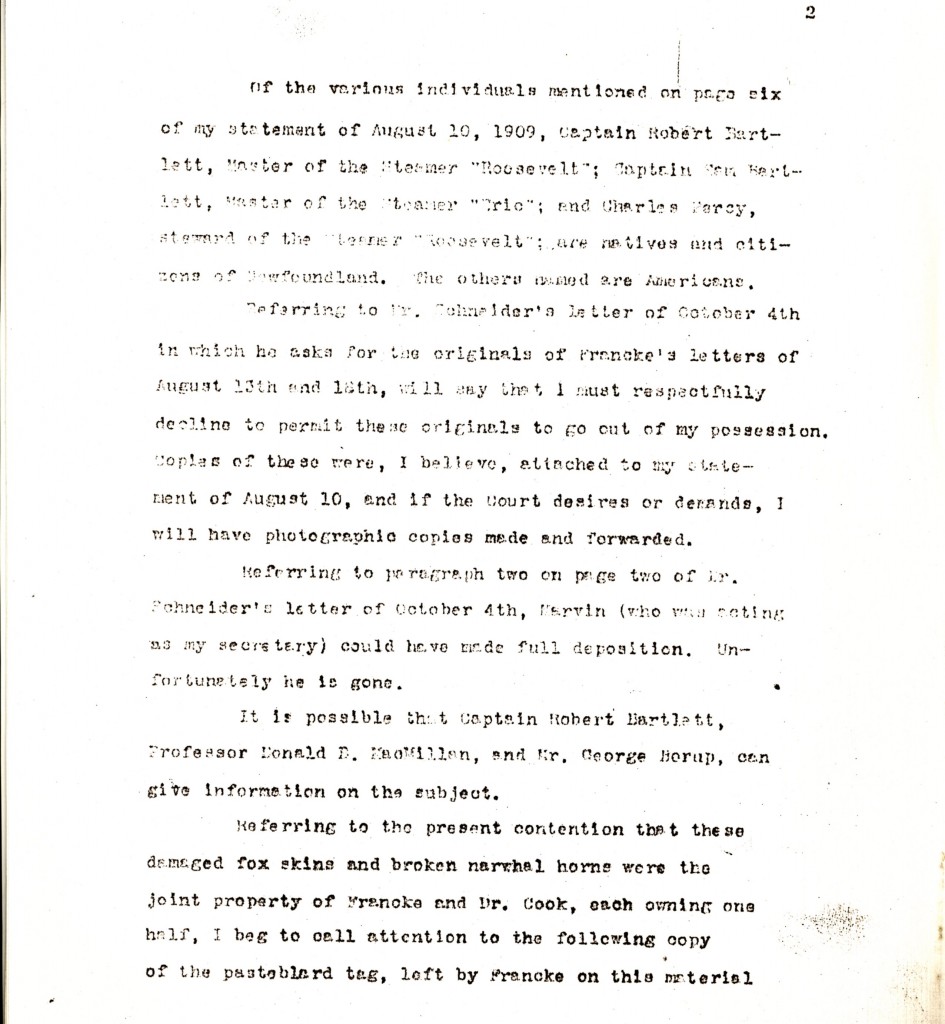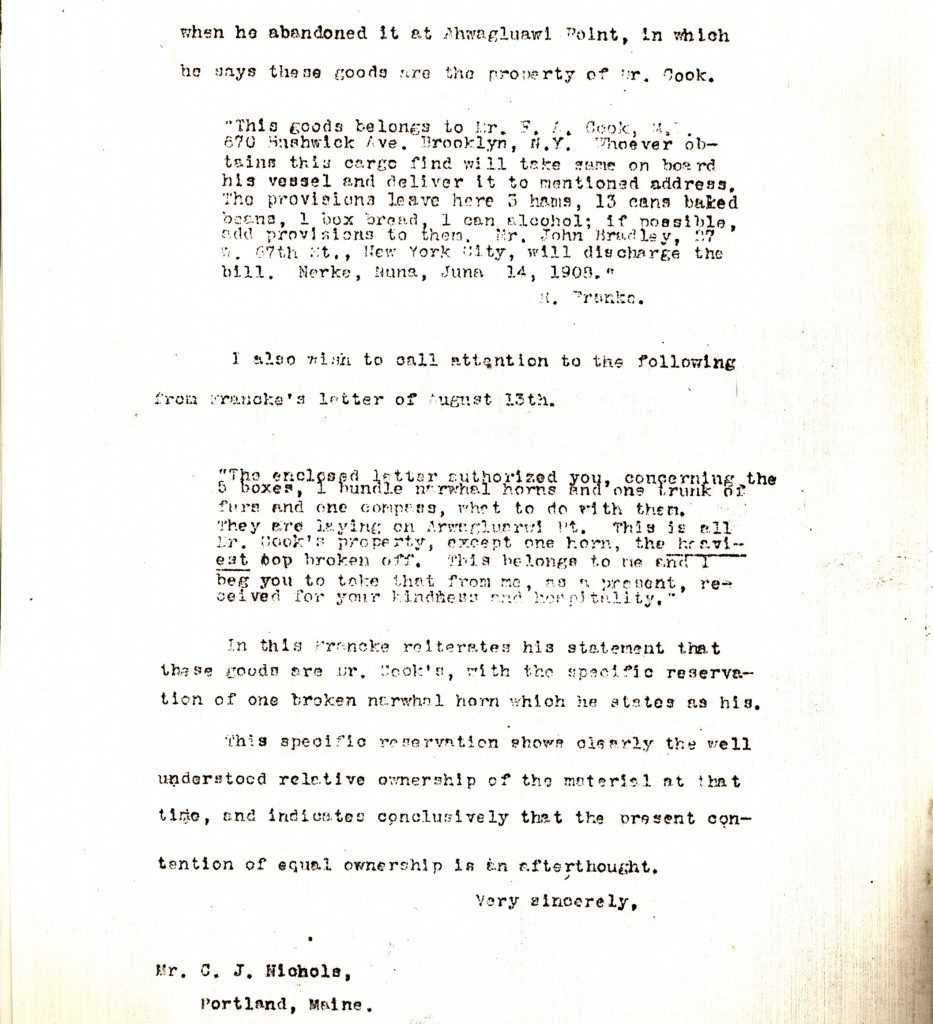Inside the Peary Expedition: Part 15: December 1912: Franke’s case against Peary is resolved
Written on August 11, 2021
The case drug on for another three years. In June 1911, a commission was sent to Canada and the United States to investigate and take testimony from several witnesses including Joe White and Henry Johnson, mentioned in Franke’s complaint. Both men were originally members of the Roosevelt’s crew, but they and all other Americans were dismissed by Peary at Sydney, leaving only Newfoundlanders to man her. Both men, however, were hired on as Able Bodied Seamen on the Erik by Captain Sam Bartlett, and so made the trip to Etah aboard her in company with Peary’s ship. Both later gave affidavits attesting to Peary’s covetousness when it came to furs and ivory, and how he traded for them at great advantage, yet banned any member of either ship’s crew from bartering with the Inuit for the like, or anything else of value. An affidavit by each man was published in the October 1910 issue of Tourist Magazine in an article authored by B.S. Osbon. We can assume that their sworn testimony to the visiting commission was similar in content.
This same commission also interviewed Dr. Cook in New York. Cook had finally returned to America in December 1910 after an absence of slightly more than a year, during most of which his whereabouts were unknown. In a letter to Peary’s lawyer from his representative, Mr. Griffith, of the legal firm of Joline, Larken & Rathbone, dated June 15, 1911, he reported that the deposition was taken before himself and the commissioner, Mr. Schurz, in Franke’s presence. He reported that Cook testified that he had not initiated the suit. While under oath he got Cook to say, after some reluctance, that he was the Cook who claimed to have reached the North Pole in 1908, adding, “And I did go there,” much to the lawyer’s delight. As he put it, “If he is still willing to assert under oath that he went to the North Pole, I should not think that a German or any other Court would care very much what else he said.”
On December 13, 1911, Peary wrote this letter to his lawyer, Charles Nichols concerning the case:

 Others who were deposed were Walter A. Larned, who had been one of the paying “guests” on the Roosevelt, and Captain Bob Bartlett. B.S. Osbon, who was to testify, had, in the meantime, died. Victor Schneider, Peary’s German lawyer, didn’t think much of the testimony for the Plaintiff. In a letter dated June 23, 1912, to Peary’s lawyer, Charles J. Nichols, Schneider said, “Johnson’s testimony amounts to absolutely nothing and Joe White appears to be a weak witness for Franke, although his testimony shows much prejudice in the matter. Franke himself was present and at intervals made himself obnoxious by his attempts to assist his witnesses. I cannot see that Franke has as yet produced any testimony outside of his own statement, to support his action, except possibly Cook’s statement that half of the furs were Franke’s.
Others who were deposed were Walter A. Larned, who had been one of the paying “guests” on the Roosevelt, and Captain Bob Bartlett. B.S. Osbon, who was to testify, had, in the meantime, died. Victor Schneider, Peary’s German lawyer, didn’t think much of the testimony for the Plaintiff. In a letter dated June 23, 1912, to Peary’s lawyer, Charles J. Nichols, Schneider said, “Johnson’s testimony amounts to absolutely nothing and Joe White appears to be a weak witness for Franke, although his testimony shows much prejudice in the matter. Franke himself was present and at intervals made himself obnoxious by his attempts to assist his witnesses. I cannot see that Franke has as yet produced any testimony outside of his own statement, to support his action, except possibly Cook’s statement that half of the furs were Franke’s.
“Certainly there is not a line of testimony that would be competent or relevant under our rules of evidence to show that any furs belonging to Cook or Franke were ever received on board either the ‘Roosevelt’ or the ‘Eric,’ and there is not a line of testimony as to any arrangements between Admiral Peary and Franke as to any demand made by Admiral Peary upon Franke.”
Franke tendered an oath for Peary to swear to, but then withdrew it, as he indicated he wished more witnesses to be deposed, including Peary, himself. However Schneider wrote to Nichols on January 16, 1913, advising Peary to ignore the withdrawal and sign the tendered oath. This he did, apparently backdating it to before the date of Franke’s withdrawal to December 9, 1912:
“I, Robert E. Peary, the defendant herein, swear {sic} before God, the Almighty and Allknowing that: ‘I did not tell the plaintiff in August 1908 at Etah, that I would only take him onto my ship “Eric” and return him to New York provided he would give me his entire collection of blue fox skins, navalhorns {sic} and walrus’ teeth, which the plaintiff and Dr. Cook co-jointly had collected, without any pecuniary consideration. SO HELP ME GOD.”
On the basis of this affidavit the case of Rudolph Franke v. Robert E. Peary, was dismissed by the German court. After all, the word of a man of the moral stature of Robert E. Peary under oath could not possibly be doubted.
The letters referred to and Peary’s sworn statement, along with many others items regarding the case are all at NARA II.
This is the last article in this series: “Inside the Peary Expedition.”
Filed in: Uncategorized.